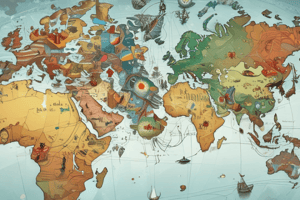Podcast
Questions and Answers
What is the primary goal of the World Trade Organization (WTO)?
What is the primary goal of the World Trade Organization (WTO)?
- To promote free and fair trade (correct)
- To monitor global economic activities
- To provide loans to low-income countries
- To create tariffs for international trade
What are trade barriers primarily imposed to achieve?
What are trade barriers primarily imposed to achieve?
- Protect domestic employment and industries (correct)
- Enhance international cooperation
- Increase tariffs on imports
- Promote free trade agreements
Which of the following is a consequence of trade wars?
Which of the following is a consequence of trade wars?
- Increased competition among countries
- Higher prices for consumers (correct)
- Increased international trade
- Strengthened global cooperation
What is the function of the International Monetary Fund (IMF)?
What is the function of the International Monetary Fund (IMF)?
Which statement best describes the role of the United Nations?
Which statement best describes the role of the United Nations?
What can be inferred about tariffs?
What can be inferred about tariffs?
What does the Global Interstate System primarily address?
What does the Global Interstate System primarily address?
Which of the following is a limitation of the United Nations?
Which of the following is a limitation of the United Nations?
What is a characteristic of demand-pull inflation?
What is a characteristic of demand-pull inflation?
Which scenario indicates an overheating economy?
Which scenario indicates an overheating economy?
What does deficit spending refer to?
What does deficit spending refer to?
What role do taxes serve in the economy?
What role do taxes serve in the economy?
Which of the following best describes fiscal policy?
Which of the following best describes fiscal policy?
What is protectionism in trade?
What is protectionism in trade?
What constitutes the labor force?
What constitutes the labor force?
What is indicated by a poor credit rating?
What is indicated by a poor credit rating?
Which of the following is a disadvantage of globalization?
Which of the following is a disadvantage of globalization?
What does GDP stand for in the context of macroeconomics?
What does GDP stand for in the context of macroeconomics?
What is purchasing power parity?
What is purchasing power parity?
Which statement about microeconomics is true?
Which statement about microeconomics is true?
What is a positive effect of globalization?
What is a positive effect of globalization?
Inflation primarily affects which economic aspect?
Inflation primarily affects which economic aspect?
What does GNP measure?
What does GNP measure?
Which aspect of globalization represents interdependence among countries?
Which aspect of globalization represents interdependence among countries?
Flashcards are hidden until you start studying
Study Notes
Globalization
- Globalization fosters interdependence among countries via exchange of goods, services, culture, communication, and lifestyle.
- Influential aspects of globalization include culture, economy, travel, lifestyle, communication, technology, and transportation.
- Results in lower product prices, job creation, business scaling, improved healthcare, and cultural understanding.
- Negative impacts encompass inequality between nations, job displacement, heightened taxes, pollution, and loss of cultural uniqueness.
- Fast transport systems and expanded global trade are associated with globalization.
Global Economy
- Economics is derived from Greek, meaning "home management," focusing on managing finite resources.
- Two categories of economics:
- Microeconomics: Studies individual households and firms.
- Macroeconomics: Examines large-scale economic factors of nations or regions.
- Gross Domestic Product (GDP) measures total monetary value of goods/services within a country, indicating economic size and growth.
- Gross National Product (GNP) represents total production by residents, both domestically and internationally.
Purchasing Power and Inflation
- Purchasing power reflects currency value in terms of goods/services buyable with one unit of money.
- Inflation decreases purchasing power and occurs due to:
- Demand Pull: Demand exceeds production.
- Cost Push: Rising production costs increase prices.
- Built In: Wages rise with an increase in prices to maintain living standards.
- More unemployment leads to decreased economic output, while low unemployment suggests economic efficiency.
Government Spending and Taxes
- Government spending on goods/services is vital for sectors like education, healthcare, and defense.
- Revenue is generated from taxes which fund government expenditure.
- Types of taxes include income tax, property tax, inheritance tax, corporate tax, capital gains tax, and sales tax.
- Deficit spending occurs when government expenditures outpace revenues, worsening debt.
Monetary and Fiscal Policies
- Fiscal Policy: Adjusting spending levels and tax rates to manage the economy.
- Monetary Policy: Managing money supply growth to achieve economic stability.
Trade Policies
- Protectionism prioritizes domestic trade, imposing restrictions (tariffs, quotas) beneficial to local economies.
- Free trade promotes unrestricted trade, enhancing competition and reducing prices.
- Tariffs are taxes on imports, affecting domestic consumers by raising product costs.
- Trade barriers protect local employment and industries, while trade wars may occur from retaliatory tariff increases.
Global Institutions
- WTO (World Trade Organization): Focuses on promoting free and fair trade among its 164 members.
- IMF (International Monetary Fund): Monitors economic activity, provides loans, and ensures monetary stability globally.
- World Bank: Aims to alleviate poverty through assistance to middle and low-income countries.
Global Interstate System
- International cooperation handles global issues, such as crimes across nations, exemplified by ASEAN's regional peace framework.
- The United Nations: Main organization for global cooperation, striving for peace and collaboration among nations.
- Limitations exist, as the UN cannot prevent all conflicts or solve every issue, and its effectiveness can be hindered by competition and favoritism.
Studying That Suits You
Use AI to generate personalized quizzes and flashcards to suit your learning preferences.



